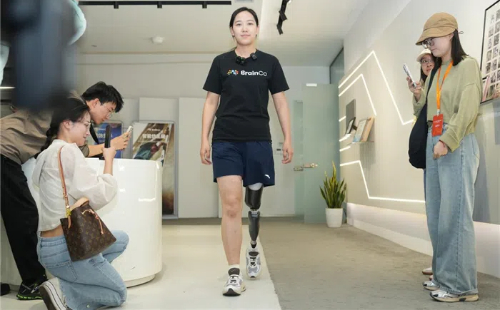Bionic tech transforms lives in Zhejiang

Gao Ruixia walks on her bionic leg in Hangzhou, Zhejiang province, on June 3. [Photo/hangzhou.com.cn]
"Since I started using the bionic leg, cycling, playing basketball, and climbing stairs are no longer a problem," said Gao Ruixia, a product experience ambassador for BrainCo.
After losing her left leg in an accident, Gao felt disconnected from the outside world, rarely leaving her home. Last year, Zhejiang province launched a project to support people with limb disabilities, providing 1,000 residents with free smart prosthetic fittings. This initiative led Gao to BrainCo's bionic leg.
The bionic leg, developed by BrainCo − a startup incubated at Harvard University and founded by Chinese engineer Han Bicheng − uses sensor systems to collect real-time data. This data is processed through algorithms and converted into commands that control the hydraulic system, allowing dynamic adaptation to the user's movements. This enables lower-limb amputees to move comfortably and safely as if controlling their own legs.
BrainCo's technology relies on a brain-computer interface (BCI) that bridges the gap between human intent and machine action. The BCI technology, used in BrainCo's bionic leg, works with a bracelet-like array of electrode sensors on the leg, interpreting electromyographic neural signals to execute movements.
"There are over 24 million people with limb disabilities in China, most of whom stay at home. We hope that our BCI technology can help them engage more with society," said Han.
BrainCo's BCI technology also extends to products aiding autistic children in rehabilitation and helping people reduce stress and improve sleep quality, ultimately enhancing overall quality of life. Han emphasized that BCI technology has the potential to revolutionize industries like healthcare, education, and human-machine interaction, aiming to support more vulnerable groups.





 play
play